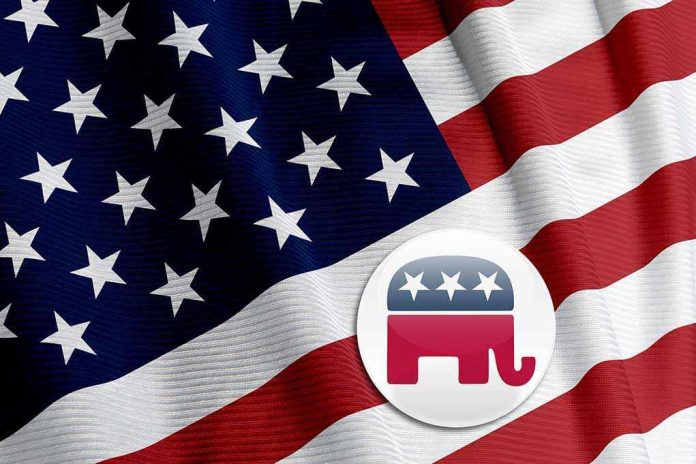
When a rising conservative star publicly accuses a party veteran of sabotaging the GOP from within, the fault lines beneath today’s Republican movement are exposed in ways that demand attention, not just from political junkies but from anyone wondering where real power in Washington is headed next.
Story Snapshot
- Senator JD Vance calls out Representative Thomas Massie for defying GOP orthodoxy on multiple fronts.
- Vance argues Massie’s independence risks isolating him and undermining party unity in critical legislative battles.
- The clash reveals deeper tensions in the Republican Party between populist insurgents and institutional conservatives.
- This public feud signals larger struggles over the direction and soul of the GOP in an era of ideological flux.
Vance’s Rebuke: Fractures in the GOP Surface
Senator JD Vance’s pointed criticism of Representative Thomas Massie landed with the force of a political earthquake. Vance, frequently seen as a voice for the new conservative populism, didn’t mince words: he accused Massie of “bucking the GOP on every single issue” and warned that making “too many enemies” would leave the Kentucky congressman isolated and ineffective. Such direct confrontation between two prominent Republicans rarely plays out so publicly, and its timing—amid fraught negotiations over spending, immigration, and party leadership—raises questions about the future of conservative strategy in Congress.
Massie’s reputation as an independent thinker is well-established, but Vance’s attack reflects mounting frustration among his peers. While Massie prides himself on voting principles over party directives, Vance’s critique frames this independence as political self-sabotage. He suggests that Massie’s pattern of opposition—on issues ranging from budget deals to surveillance reform—risks rendering him powerless in Washington’s coalition-driven environment. For many conservatives, the tension between ideological purity and legislative pragmatism is not just theoretical; it is the crucible in which their political futures are forged.
Independence Versus Influence: The Conservative Dilemma
Massie’s career has always balanced precariously on the edge of party orthodoxy. His skepticism of government overreach and his libertarian streak have earned him both admiration and exasperation within the GOP. Vance’s argument, however, cuts to the heart of a central dilemma: in a system built on alliances and negotiation, how much independence is too much? Massie’s votes against party-backed bills may reflect his commitment to principle, yet they also risk marginalizing him in critical moments when unity is needed to advance conservative priorities. The GOP’s internal debate is increasingly shaped by this contest between uncompromising conviction and the need to wield real influence.
Vance’s remarks tap into a broader anxiety among Republicans. As the party faces challenges from both the left and its own insurgent wing, leaders are searching for ways to balance authenticity with effectiveness. Massie’s approach, while popular with certain grassroots constituencies, has often put him at odds with leadership and made him a lightning rod for criticism. Vance’s public rebuke, then, may be less about one man’s voting record and more about the struggle to define what it means to be a conservative in a shifting political landscape.
Populism, Principle, and the Path Ahead
The Massie-Vance clash is emblematic of a larger transformation underway in the Republican Party. As populist voices gain ground and traditionalists fight to maintain control, the question of who sets the agenda—and how—is increasingly contested. Massie’s defiance has made him a symbol of the party’s anti-establishment wing, while Vance’s critique speaks for those who prioritize unity and legislative wins. This tension is not new, but the stakes are rising as conservative voters demand both authenticity and results.
Looking ahead, the outcome of this internal conflict will shape not only the fate of individual lawmakers but the broader trajectory of American conservatism. If Vance’s warnings prove prescient, Massie and his ilk may find themselves sidelined as the party pivots toward consensus-building. Alternatively, if Massie’s model of principled independence resonates with voters, the GOP could face further fragmentation—and possibly a redefinition of what it means to be a Republican in the 21st century. For now, the feud between Vance and Massie remains a microcosm of the challenges, opportunities, and unresolved questions at the heart of the conservative movement.
Sources:
Conservative Review: Vance Calls Out Massie for Bucking the GOP



